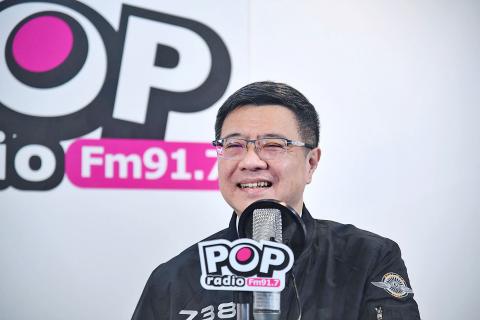The Democratic Progressive Party (DPP) is expected to nominate a candidate for next year’s presidential election by the middle of April, party chairman Cho Jung-tai (卓榮泰) said in a radio interview yesterday.
After the registration for the DPP’s nomination closes, the party would host either an event for candidates to present their platforms or a debate before conducting a poll, he said.
In the lead-up to the past two presidential elections, the DPP announced its presidential nominee in April of the preceding year.

Photo: CNA
Sources said that members of the DPP believe the popularity of President Tsai Ing-wen (蔡英文), who might be seeking re-election, has surged after she issued a firm response to Chinese President Xi Jinping’s (習近平) speech on Jan. 2 calling for unification under a “one country, two systems” model.
However, media reports said that other DPP members, such as former premier William Lai (賴清德) and Premier Su Tseng-chang (蘇貞昌), are also potential candidates.
Asked whether Tsai might still name Lai as her running mate — a subject of wild speculation by the media — if the former premier were to propose formal independence, Cho said that Lai is a DPP member and must adhere to the party’s platform and its Resolution on Taiwan’s Future (台灣前途決議文), which clearly states that Taiwan is an independent nation and that any decision to change the “status quo” should be made by Taiwanese voters.
Lai would not “overstep this boundary,” Cho said.
Speaking about future relations between the DPP and independent forces — political parties and politicians outside of the DPP and the Chinese Nationalist Party (KMT) — Cho said that as the ruling party, the DPP’s goal in next year’s election is to maintain control over the national government.
That means there is “no room for bargaining” and the DPP would definitely be nominating its own presidential candidate, he said.
The DPP could still discuss cooperation with third-party forces in the legislative elections, which will be held simultaneously, but it would nominate a DPP candidate for president, he said.
Asked whether Taipei Mayor Ko Wen-je (柯文哲) might be named as the DPP nominee’s running mate, Cho said that he believed Ko “has not been preparing” for such a scenario.
Asked whether DPP candidate Ho Chih-wei’s (何志偉) victory in the Taipei legislative by-election on Sunday has boosted his position as party chairman, Cho said that the result was not about individual success.
The outcome allowed the DPP to temporarily strengthen its foothold and gain a better understanding of what to do next, he said.

CHANGING LANDSCAPE: Many of the part-time programs for educators were no longer needed, as many teachers obtain a graduate degree before joining the workforce, experts said Taiwanese universities this year canceled 86 programs, Ministry of Education data showed, with educators attributing the closures to the nation’s low birthrate as well as shifting trends. Fifty-three of the shuttered programs were part-time postgraduate degree programs, about 62 percent of the total, the most in the past five years, the data showed. National Taiwan Normal University (NTNU) discontinued the most part-time master’s programs, at 16: chemistry, life science, earth science, physics, fine arts, music, special education, health promotion and health education, educational psychology and counseling, education, design, Chinese as a second language, library and information sciences, mechatronics engineering, history, physical education

DEADLOCK: As the commission is unable to forum a quorum to review license renewal applications, the channel operators are not at fault and can air past their license date The National Communications Commission (NCC) yesterday said that the Public Television Service (PTS) and 36 other television and radio broadcasters could continue airing, despite the commission’s inability to meet a quorum to review their license renewal applications. The licenses of PTS and the other channels are set to expire between this month and June. The National Communications Commission Organization Act (國家通訊傳播委員會組織法) stipulates that the commission must meet the mandated quorum of four to hold a valid meeting. The seven-member commission currently has only three commissioners. “We have informed the channel operators of the progress we have made in reviewing their license renewal applications, and

The High Prosecutors’ Office yesterday withdrew an appeal against the acquittal of a former bank manager 22 years after his death, marking Taiwan’s first instance of prosecutors rendering posthumous justice to a wrongfully convicted defendant. Chu Ching-en (諸慶恩) — formerly a manager at the Taipei branch of BNP Paribas — was in 1999 accused by Weng Mao-chung (翁茂鍾), then-president of Chia Her Industrial Co, of forging a request for a fixed deposit of US$10 million by I-Hwa Industrial Co, a subsidiary of Chia Her, which was used as collateral. Chu was ruled not guilty in the first trial, but was found guilty

Taiwan People’s Party (TPP) Chairman Huang Kuo-chang (黃國昌) yesterday appealed to the authorities to release former Taipei mayor Ko Wen-je (柯文哲) from pretrial detention amid conflicting reports about his health. The TPP at a news conference on Thursday said that Ko should be released to a hospital for treatment, adding that he has blood in his urine and had spells of pain and nausea followed by vomiting over the past three months. Hsieh Yen-yau (謝炎堯), a retired professor of internal medicine and Ko’s former teacher, said that Ko’s symptoms aligned with gallstones, kidney inflammation and potentially dangerous heart conditions. Ko, charged with